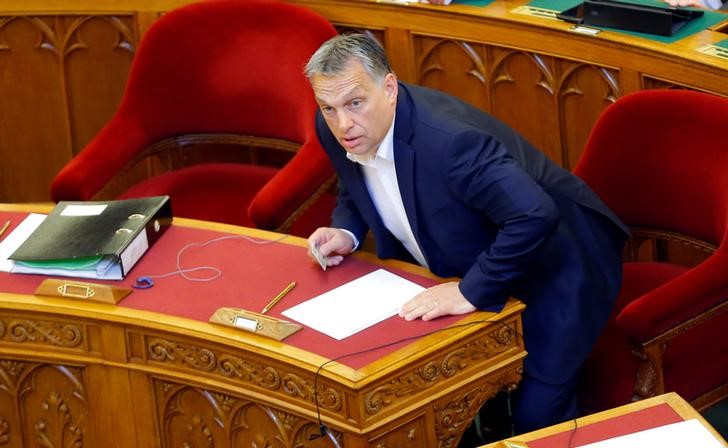By Krisztina Than and Gergely Szakacs
BUDAPEST (Reuters) - Hungary's president on Monday signed new legislation on foreign universities that could force out a top international school founded by U.S. financier George Soros, despite large protests against the move by the nationalist government.
Tens of thousands of Hungarians rallied on Sunday in one of the biggest demonstrations against Prime Minister Viktor Orban's seven-year-old rule, denouncing a law that critics and opposition parties say targets the Central European University (CEU) set up by Soros, a global campaigner for liberal "open society".
More than 500 leading international academics, including 17 Nobel Laureates, have also come out in support of CEU, founded in Budapest in 1991 after the collapse of communism, saying it was one of the pre-eminent centres of thought in Hungary.
President Janos Ader, a long-time political ally of Orban, said he believed the legislation did not infringe academic freedom or international laws, and urged the government to hold talks with universities.
"It is the interest of all of us that the value created at foreign universities in Hungary in the past years should continue and accumulate further and academic work should continue undisturbed," Ader told state news agency MTI.
Another protest rally is scheduled for Wednesday.
Orban, who faces elections in 2018, is not expected to backtrack on the legislation as it constitutes a major plank of his political strategy defending national interests, against what his government calls foreign meddling in Hungarian affairs.
Orban, whose Fidesz party has a firm lead in opinion polls, has often vilified Soros, whose ideals are squarely at odds with the Hungarian premier's view that European culture is under an existential threat from migration and multiculturalism.
"DISINFORMATION"
Orban told parliament on Monday that there was a "disinformation campaign" under way against Hungary similar to the criticism it received from fellow European Union countries over its tough line against refugees and migrants.
"The government does not close down any universities and does not close down CEU either ... The aim of the government is to ensure that all universities are governed by the same rules, and there should not be privileges," he said.
The new law requires foreign universities to have campuses both in Budapest and their home country. The CEU operates in Budapest but is the only international college with no branch outside Hungary.
CEU has said its dual U.S.-Hungarian identity permitted it to comply with both Hungarian and U.S. laws and award both Hungarian and U.S.-accredited degrees. It has said it is committed to staying in Hungary.
After a similar protest a few years ago against a government plan to tax Internet traffic, Orban scrapped the move. But the situation with foreign universities is different, said Attila Juhasz, a political analyst at think tank Political Capital.
"This is a long-form strategy that they (Fidesz) want to maintain until the elections, so it is much more difficult to backtrack on this. This is not just about CEU, this all fits into the campaign against Soros," Juhasz said.
"This is part of the political ideology that is a foundation stone of Orban's system - national interests against foreign interests."

Orban's right-wing government has been tightening up on dissent in other ways as well, proposing tighter rules on non-governmental organisations (NGOs), which will have to register with authorities if they have a yearly foreign income of 7.2 million forints (23,580 pounds).